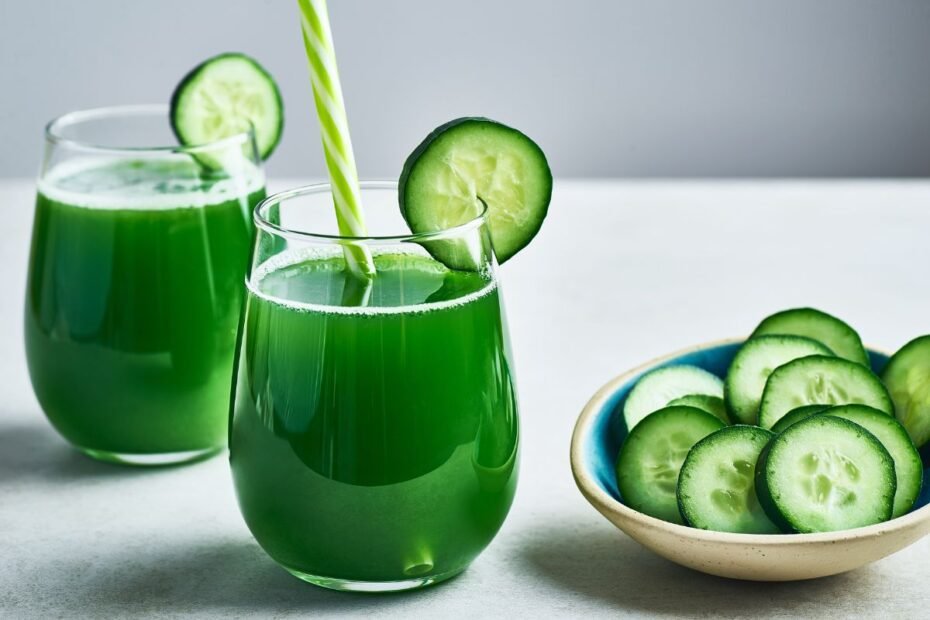Cucumbers are a familiar vegetable in cuisines. Many love these vegetables for their fresh taste, crunchy texture, pleasant aroma, and versatility. In fact, you can eat cucumbers without remorse, as they are mostly water, rich in various nutrients, and very low in calories. From fresh or fermented vegetables as a side dish to cucumber juice, it’s simple to incorporate cucumbers into your diet and make every day different. The topic of this article is cucumber juice. We’ll discuss cucumber juice benefits, provide tips on its proper preparation, ideas for delicious variations, and more entertaining information. After reading this article, you will want to grow your cucumbers.
Some Interesting Facts About Cucumbers
Cucumbers are one of the oldest vegetables in the world, having been used as a foodstuff for more than 3000 years. Cucumbers originated in India. However, according to documented records, ancient Egypt and the ancient world also ate cucumbers. The Roman Emperor Tiberius (reigned 14-37 AD) was so fond of cucumbers that he ordered them to be served daily. The Frankish King Charlemagne (reigned 800-814) grew cucumbers in his gardens in present-day Italy.
At the turn of the 15th and 16th centuries, cucumbers made their way to the ‘New World’ with the expeditions of Christopher Columbus. During the reign of King Henry VIII (first half of the 16th century), cucumbers were introduced to England. His first wife, the Spaniard Catherine of Aragon, insisted on cucumbers in her menus.
The ‘historical’ cucumbers were probably very bitter because of the naturally occurring substance cornbitacin. Although plant breeders have worked hard to develop non-bitter varieties, cucumbers have retained this inherent quality to this day. Everyone has probably tasted a bitter cucumber. The cucurbitacin concentration depends on the growing conditions of these vegetables. Ideally, it should be in a slightly shaded and moist place. The drier the air and the more direct sunlight, the higher the cornbitacin in the cucumber appears. Although it does not enhance the taste, recent research has shown its potential benefits in cancer treatment.
A cucumber is more than 90 percent water. This vegetable has a unique characteristic: the inside can be up to 20 degrees cooler than the outside. This is why cucumbers are primarily associated with freshness and coolness. The cucumber is a rapidly fast-growing vegetable and tastes best when young and not overgrown. The biggest cucumber ever grown was about 170 cm long and weighed almost 70 kg!
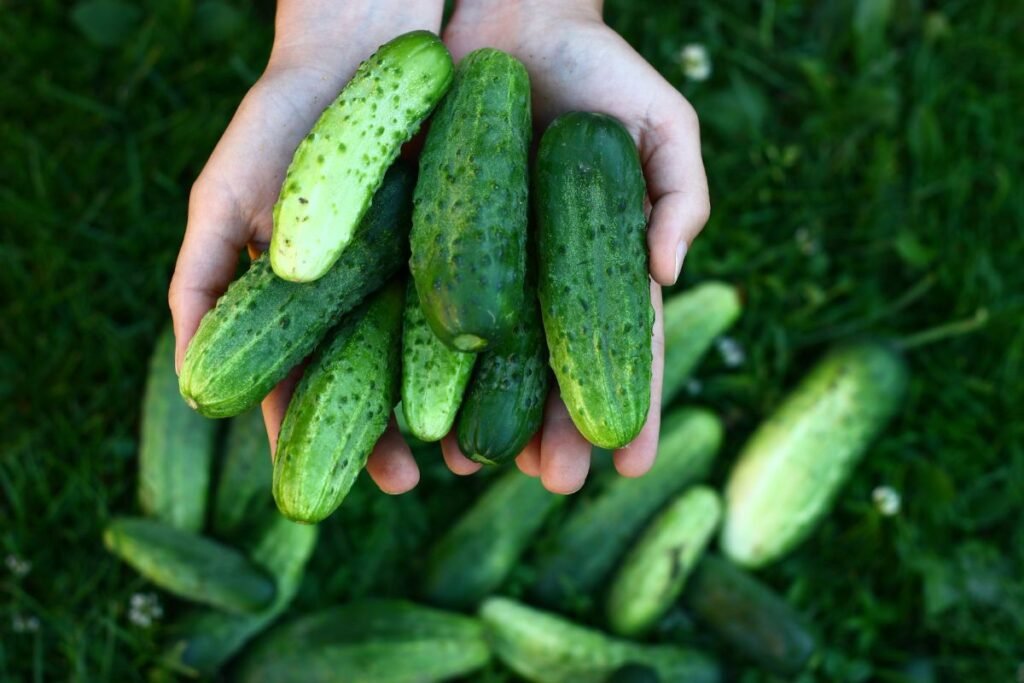
7 Health Benefits of Cucumber Juice
Cucumbers were primarily associated with “diet food” due to their low-calorie content for many years. However, recent studies have shown that this water-filled vegetable contains essential nutrients for the human body and provides health benefits. Here are the main properties of cucumber juice:
Ensures adequate fluid intake. Everybody knows that consuming an optimal amount of 6–8 glasses of water daily prevents dehydration. Cucumber juice is one of the best drinks for maintaining the moisture balance.
It cleanses the body and helps to lose weight. Raw vegetable juice has detoxifying properties. In addition, cucumbers are low in calories. So, adding cucumber juice to your diet and replacing it with other sugary drinks can produce impressive results.
Enriches the body with antioxidants. Studies have long confirmed that antioxidants are essential in the fight against free radical damage to the human body. Fruits and vegetables are sources of antioxidants.
Cucumber juice may have anticancer properties. In addition to the antioxidants already mentioned, cucumbers contain a chemical compound called cornbitacin (which gives cucumbers their bitterness) and nutrients called lignans. Initial studies show promising findings on the potential substances for the treatment and prevention of cancer. A study published in the Journal of Cancer Research reports on the potential of the flavonoid fisetin in cucumbers to slow the progression of prostate cancer.
Cucumbers may help lower blood pressure. These vegetables contain potassium, one of the electrolytes that help regulate the kidneys’ sodium (salt) amount. The excessive amount of salt retained in the body causes high blood pressure. Cucumber juice enriches the body with potassium and helps balance sodium levels, thus contributing to the normalization of blood pressure.
Juices help the skin to retain health. Adequate fluid intake and a toxin-free body are the keys to beautiful skin. In addition to these properties, cucumber juice also contains pantothenic acid, or vitamin B5, which is crucial for the successful treatment of acne.
It can help strengthen bones. One cup of cucumber juice contains about 19% of the recommended daily intake of vitamin K. This vitamin is essential for proper blood clotting, healthy tissues, and bones.
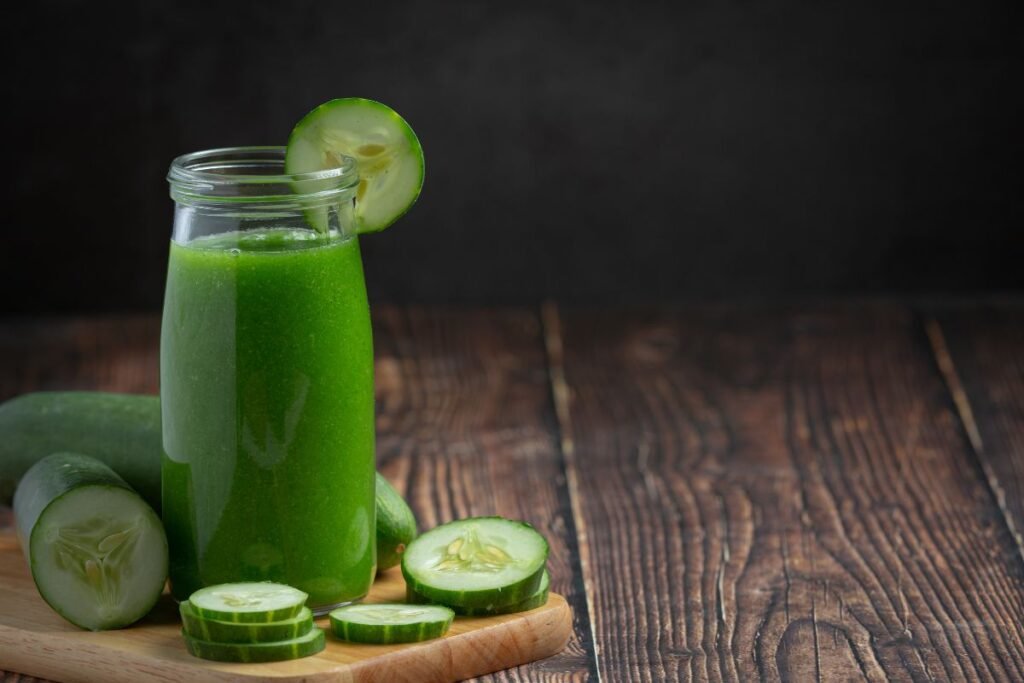
Homemade Cucumber Juices—Fresh, Healthy, and Calorie-Free
Cucumber juice is the perfect choice for many occasions: to refresh yourself, to diversify your fluid intake, or for a one-off shot of vitamins and minerals. Only eight calories occur in a cup of fresh cucumber juice. Therefore, you can safely drink it at any time of the day.
Homemade cucumber juice is the best value. It is extra simple to make—just cucumbers and a little water. Mash the ingredients in a food processor or cocktail shaker until smooth. If necessary, strain through a sieve before drinking.
For best results, it is important to choose fresh, organic vegetables. Do not use cucumbers that have lost their crispness and firmness and are wrinkled. These have already lost much moisture and nutrients. Similarly, nobody recommends you use overgrown, yellowed, and hardened skin cucumbers for juicing.
You can flavor these juices with additives—from herbs to vegetables or citrus fruits.
How Do I Make Cucumber Juice Correctly?
Cucumber juicing does not require any special knowledge or equipment, although you can use some tips:
- It is advisable to peel the cucumbers. This procedure will allow you to avoid any probable bitterness. It also makes juice smoother and more solid.
- Cut the peeled cucumbers into smaller pieces. Cutting the cucumbers will make the mashing faster and easier.
- Rub the cucumbers with a drop of water for at least 2 minutes. Although the blending time depends on the power of the machine, 2 minutes should give you a smooth, even consistency.
- Pour the juice into the glass through a strainer. You will avoid excess foam and any remaining lumps.
- Consume the juice as quickly as it is prepared. Cucumber juice starts to oxidize and loses some of its beneficial properties.
- If you have not consumed cucumber juice immediately, store it in the refrigerator in an airtight container for up to 24 hours.
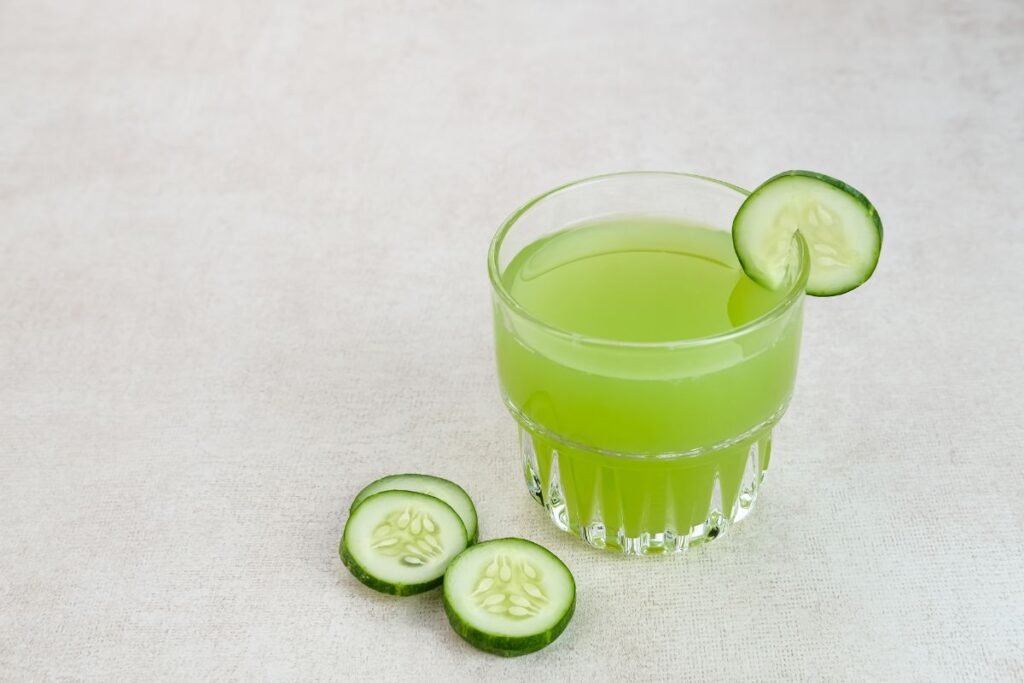
Cucumber Juice and The Tastiest Combinations
Cucumbers are one of the most multipurpose vegetables, with a refreshing taste that goes with many ingredients. Cucumber juice is tasty and nutritious in its pure form. However, sometimes, you can spice up the flavor with your favorite additives or discover new flavor combinations. Here are some ideas:
- Cucumbers and herbs. The classic combination is cucumber and dill. However, try to add parsley, basil leaves, coriander, or mint to cucumber juice. Spicy lovers can try a combination of cucumber juice and cayenne pepper.
- Cucumbers and other vegetables. Vegetables with a high water content, such as celery, courgettes, and various leafy vegetables, are also the most suitable. A pinch of salt will not damage this vegetable version of cucumber juice. Try to add some of the herbs mentioned in these vegetable combinations.
- Cucumbers and fruit. Cucumber combinations with melon or watermelon juices make very refreshing and tasty mixtures. A squeeze of citrus juice such as lemon, lime, orange, or grapefruit will also brighten the taste of these juices.
Frozen Cucumber Juice—More than One Use
Frozen cucumber juice can help in the most unexpected situations. Therefore, it is an idea to have a stock of them. It is best to freeze cucumber juice in small portions, for example, in ice cream or ice cube trays. You can keep fresh cucumber juice in the freezer for up to a year. Here’s what you can do with frozen cucumber juice:
- Thaw a portion of the juice and drink it.
- Enjoy ice cream made from frozen cucumber juice on a hot summer day.
- Use cucumber-flavored ice cubes to chill a variety of drinks.
- Utilize cucumber juice cubes to refresh the skin of the face and décolleté.
- Frozen cucumber juice cools bruising, swelling, insect bites, etc.
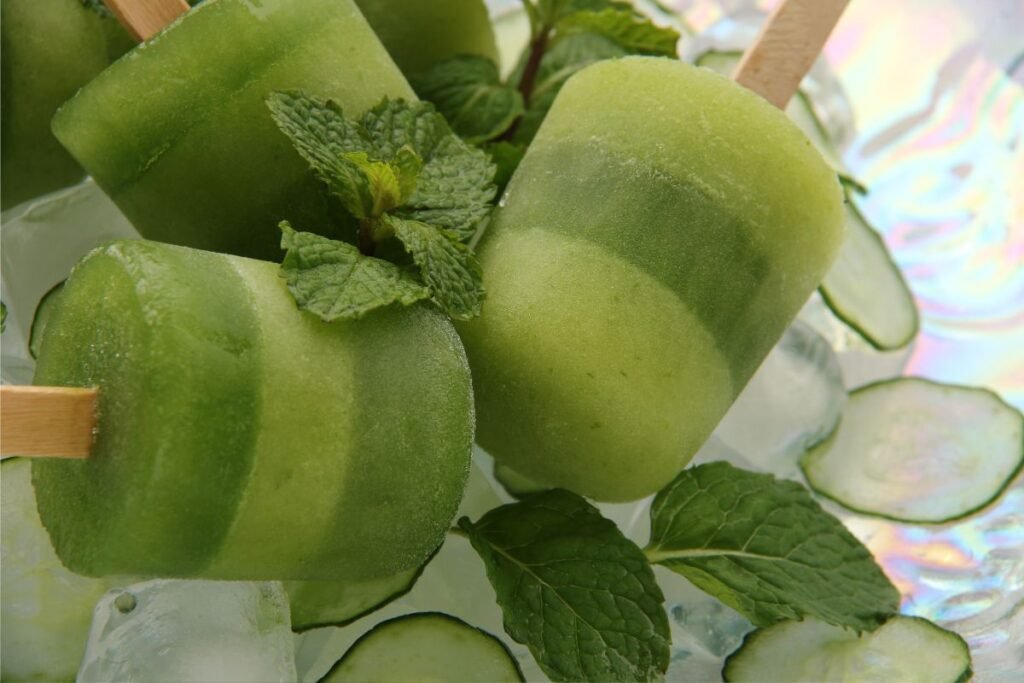
Cucumber Juice—A Drink for Almost Everyone
There is no evidence that cucumber juice can have side effects. They are perfectly safe for people with no medical contraindications. However, an overdose of cucumber juice can provoke adverse reactions in the body. It may disturb digestion and provoke vomiting or diarrhea. Exercise some caution when:
- You suffer from gastrointestinal diseases, such as stomach ulcers. In this case, cucumber juice may be difficult to digest.
- Cucumber juice can lower blood pressure excessively for patients taking medication for this disorder.
- You are allergic to cucumbers.
- For women who are breastfeeding, cucumber juice can cause colic in the baby’s abdomen.
Sources:
- https://www.healthline.com/health/food-nutrition/cucumber-water
- https://pubmed.ncbi.nlm.nih.gov/23098877
- https://www.medicalnewstoday.com/articles/323694
- https://www.intechopen.com/chapters/76616
- https://ipm.missouri.edu/meg/2014/3/Cucumber-A-Brief-History
- https://www.ncbi.nlm.nih.gov/pmc/articles/PMC3612419
Associative photos from © Canva
